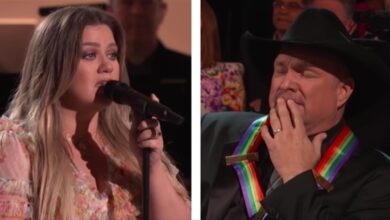Vince Gill Would Be Proud Of You, Girl; It’s The Most Beautiful Song Ever Sung
“Go Rest High On That Mountain” is a deeply moving composition by Vince Gill, who is widely recognized as one of the leading figures in country music. The song was released in 1995 and holds significant emotional weight as it serves as a tribute to Gill’s late brother, while also resonating with anyone experiencing loss. The track’s impact lies in its ability to articulate the emotional turbulence associated with grief, wrapping listeners in a comforting blanket of shared experience and understanding. Through its poignant lyrics and melodic simplicity, the song encapsulates themes that transcend the personal, offering solace to a wide audience.
Vince Gill’s impeccable vocal delivery is characterized by its authenticity and warmth, which further enhances the song’s powerful narrative. He weaves together elements of love and loss, expressing a profound hope for the afterlife, which is a universal sentiment that resonates with many who have experienced the death of a loved one. The gentle instrumentation accompanying Gill’s voice highlights the contemplative nature of the song, inviting listeners to reflect on their own lives and relationships, as they navigate the complex emotions surrounding loss.
In a significant reinterpretation in 2016, Kelly Clarkson brought “Go Rest High On That Mountain” back into the public eye. Her version served not only as a homage to Gill’s original masterpiece but also as a heartfelt tribute to various notable figures who had passed away, including music legends like Prince and David Bowie, as well as rising star Christina Grimmie. Clarkson breathed new life into the song, enabling it to resonate with a contemporary audience during a time marked by considerable grief in the entertainment community. Her emotional performance and the timely context made her rendition particularly poignant.
Clarkson’s inclusion of additional lyrics allowed her to personalize the narrative, crafting verses that paid tribute to each artist’s legacy. When she sang about Prince, describing him as a “purple heart,” it was not merely a nod to his artistry but a deeper recognition of his impact on music and culture. This creative reimagining sparked a sense of connection among her audience, transforming individual stories of loss into a collective experience. By focusing on notable figures, Clarkson highlighted the void left in the industry, reinforcing the idea that every life, whether public or private, tells a unique story.
The emotional core of Clarkson’s rendition is exemplified in her powerful vocal performance. The song’s simple yet profound chorus, which echoes Gill’s original lines, conveys a message of peace and acceptance that is comforting for those grappling with grief. The melodic structure, marked by its serene and reflective quality, serves as both an invitation for introspection and a reminder that those who have passed remain in the hearts of those who loved them. Clarkson’s ability to evoke such depth of emotion showcases her artistry and the transformative power of music.
The arrangement of Clarkson’s version further amplifies the emotional impact of the song. The orchestration serves as a lush backdrop, enhancing the solemnity while simultaneously celebrating the lives of those remembered. This intricate combination of vocals and rich instrumentation engages listeners on multiple levels, allowing them to feel both the weight of sorrow and the uplift of remembrance. As Clarkson’s voice soars against the profound musical landscape, audiences are drawn into a shared moment of reflection and nostalgia.
Vince Gill’s legacy in country music is profound, marked by numerous accolades including Grammy Awards and nominations from the Country Music Association. Beyond his commercial success, Gill is revered for his ability to tell relatable stories, crafting songs that resonate deeply with fans. His influence can be felt across genres, as artists like Clarkson continue to honor and reinterpret his work, bridging generational gaps and universal themes through their own artistic lenses.
Similarly, Kelly Clarkson has carved her niche as a versatile artist, celebrated for her powerful vocals and emotional depth. Her win on “American Idol” marked the beginning of a stellar career that spans various musical styles, including pop, rock, and country. Clarkson’s dedication to authenticity in her performances aligns her closely with Gill’s artistic vision, showcasing how deeply personal narratives can foster connections among listeners across diverse backgrounds.
The message inherent in “Go Rest High On That Mountain” serves as a reminder of the unifying power of art in times of sorrow. Music has a unique ability to heal, transforming personal grief into shared tributes. Both Gill’s original and Clarkson’s homage have solidified the song’s place in memorial services, evoking a sense of comfort and hope in the face of loss. The song emphasizes that while the final goodbye may be heart-wrenching, love persists and memories remain vivid.
In essence, the journey of “Go Rest High On That Mountain,” from Gill’s heartfelt inception to Clarkson’s modern adaptation, encapsulates a universal experience of mourning and remembrance. Both interpretations reflect the enduring power of love, connection, and hope, resonating across generations. As listeners engage with the song, they are gently reminded that the legacies of those who have left us continue to shine brightly through the memories we hold dear, demonstrating that love ultimately conquers loss.





